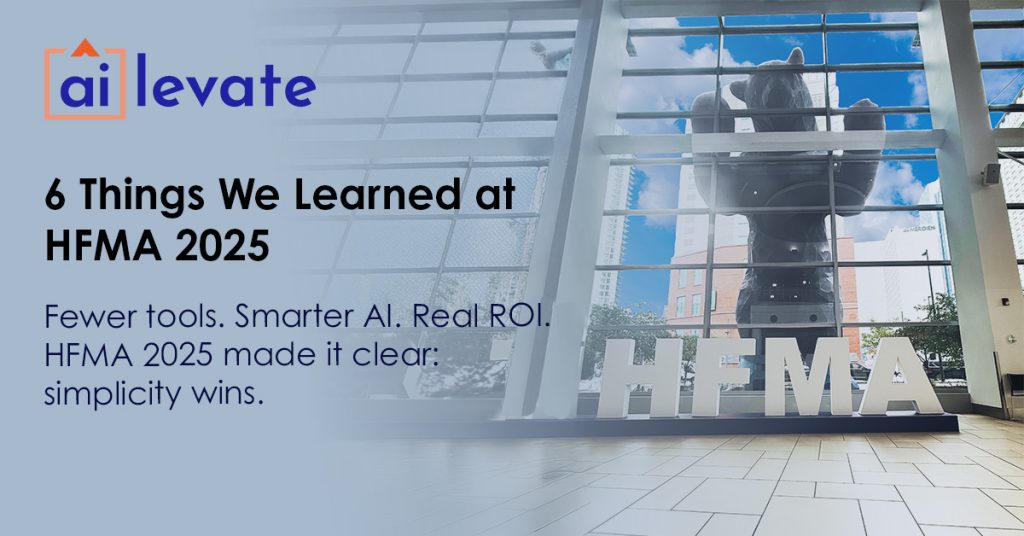The HFMA Annual Conference 2025 in Denver brought together healthcare finance professionals from across the country for three days of honest conversations, shared frustrations, and a collective desire for change. While the exhibit hall was full of innovation, the most valuable insights came from the candid hallway conversations and unfiltered panel discussions. Here is what we heard and what it means for the road ahead.
- Fragmentation and Vendor Fatigue
The message was loud and clear: revenue leaders are overwhelmed by the number of tools stacked on top of their EHR. Some health systems are juggling 15 to 30+ platforms just to manage RCM operations.
“What’s my total cost of ownership of those other RCM technologies versus what I’m paying with the EHR?”
The fatigue is real. Leaders aren’t looking for more vendors. They’re looking for fewer, smarter, more integrated solutions that reduce complexity instead of adding to it.
Guidance:
- Before adding a new tool, map how it works with your EHR, not around it
- Look for solutions that consolidate effort, not add another login
- Ask vendors to articulate their Total Cost of Ownership (TCO), not just price
- AI: Buzzword or Breakthrough?
AI was everywhere at HFMA, but many attendees rolled their eyes at the term. Many attendees expressed skepticism about the term, citing overuse and under-delivery.
“Everyone says they use AI, but we all know it’s bull****.”
– VP of RCM, large Utah health system
The takeaway? The market is saturated with AI claims but starved for proof. Leaders are done with AI as a buzzword. They want to see measurable outcomes, not another shiny automation demo.
Guidance:
- Focus on AI that solves specific, high-value use cases
- Evaluate outcomes over algorithms; results over hype
- Metrics Matter More Than Ever
Across sessions and demos, one theme stood out: measurable value. Health systems are tracking performance before, during, and after the implementation of new tools and technologies. Dashboards, often built in Tableau, are being used to monitor key metrics like:
- AR days
- Clean claim rate
- POS collections
- Denial rates
- % A/R > 90 days
- Cost to collect
The message was clear: if a solution can’t show improvement in these areas, it won’t last.
Guidance:
- Ask every vendor: Which metric will this improve?
- Build dashboards that track pre- and post-deployment impact
- Hold vendors accountable to those numbers
- One Size Doesn’t Fit All
Another recurring theme was the uniqueness of each organization’s workflows and challenges. Leaders voiced frustration with rigid, off-the-shelf solutions that fail to adapt to their specific needs.
“Our team is unique. Our workflows are different. We can’t use something off-the-shelf.”
Flexibility and customization are no longer nice-to-haves; they’re essential.
Guidance:
- Prioritize solutions that offer edge-case adaptability
- Ask about configuration vs. customization; can it flex without IT support?
- Involve frontline teams in vendor evaluation to ensure fit
- Strategic Over Trends
- Denials are inevitable: Prevention is ideal, but management is mandatory
- Adoption friction kills ROI: Even great tools fail if they’re hard to implement
- Electronic Health Records (HER), like Epic, are the gravitational center: Every new solution must integrate deeply or face resistance
- What Health Systems Want
In the face of rising costs, reimbursement challenges, and staffing shortages, health systems are seeking partners, not just vendors. They want clarity, control, and answers to tough questions:
- What’s the ROI? And how fast?
- Who supports onboarding and training?
- How fast can it be implemented?
- Can it handle to our edge cases?
- Will it reduce my teams workload? Or just shift it?
HFMA 2025 wasn’t just a showcase of technology; it was a call for simplicity, transparency, and real partnership. The industry is ready for change. The question is: who’s ready to lead it?
Where Ailevate Fits In
HFMA 2025 wasn’t just a conference; it was a wake-up call. The industry isn’t just ready for change. It’s demanding it.
At Ailevate, we’re here to lead that shift. Our AI-powered revenue recovery platform is built to solve the exact pain points outlined above:
No bolt-on bloat, our platform works within your existing systems.
No vague claims, our AI agents are trained on real-world denial patterns.
No added headcount, our bots run silently in the background, identifying, correcting, and helping to recover denied claims.
Ready to See Real AI in Action?
Visit www.ailevate.com to learn how you can recover revenue, not add complexity.
